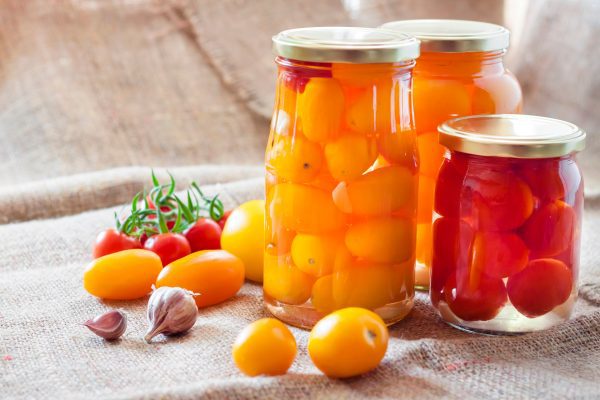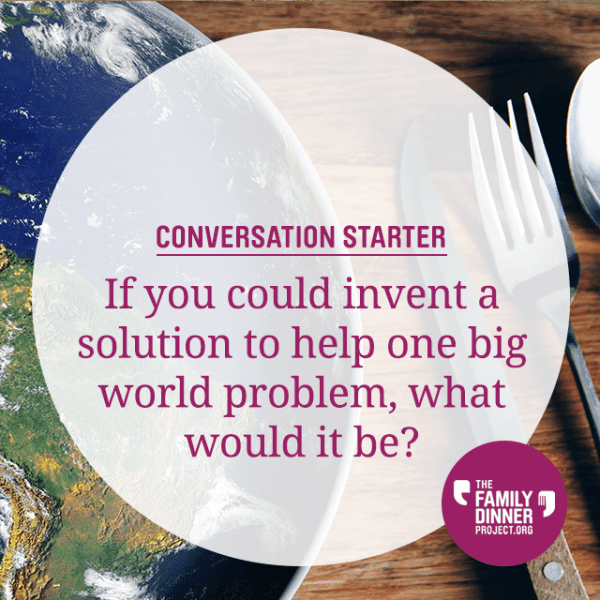Newsletter: March 2020
Fostering STEM Learning at Family Dinner

If you’re a parent or teacher, you’ve heard about the importance of STEM: Science, Technology, Engineering and Math learning for kids. We often talk about how family dinners can boost kids’ grades and improve their literacy skills. But can family dinner also have an impact on STEM learning? And what can families do to ensure that mealtimes open kids’ minds to curiosity in the math and science fields?
Researchers have discovered that when parents engage kids in math-related activities and conversations at home, math scores rise. You don’t have to use flash cards and drill-and-kill methods; making math fun and using it in hands-on, practical ways is more likely to get the result you want (a kid who feels comfortable with math skills AND enjoys family dinner without the pressure of pop quizzes). But many of us don’t think of ourselves as “math/science people,” so we may not feel comfortable engaging our kids around STEM topics the same way we do with word games and creative play. Fortunately, there are lots of simple ways to make STEM a part of your family time, whether you’re a “STEM person” or not!
- Cook together. One of the easiest things you can do to reinforce math and science concepts at home is to cook and bake together. With very young kids, practicing basic measuring, weighing ingredients, and observing changes in food as it cooks (“Look…heat makes the pancake brown and firm to the touch!”) are all STEM-related skills. As your young sous-chefs get older, encourage more critical thinking and observation. Use measuring as a way to work on adding, subtracting and multiplying fractions, or have them work in both imperial and metric measurements so they start to learn quarts, pints, liters, milliliters, and so on. Ask them to double and triple recipes, or cut them in half, as a way to demonstrate how math works in real life. Talk about the chemical reactions that happen in baking, such as what happens when you mix baking soda and vinegar. Encourage them to try simple experiments like changing the amount of yeast in a bread recipe, swapping baking powder for baking soda, or changing the baking time.
- Play with food. We frequently recommend letting kids play with food, because it’s such a good way to get them excited about trying new things and participating in mealtimes. But you can also use food play to build STEM skills! Try offering toothpicks and marshmallows, and challenging kids to build the highest tower they can with those materials. Or make gingerbread houses (you can use graham crackers for an easy gingerbread stand-in) and encourage kids to try different methods of putting things together. And of course, there’s always the “mad scientist” approach of letting them raid the pantry and mix together different ingredients just to see what happens.
- Encourage observation and curiosity. All discoveries begin with noticing and wondering, so make a habit of mentioning things that you learned or observed during the day and what your follow-up questions are. Did you read an article about sleep habits that made you wonder how sleep needs change throughout our lives? Did you notice a change in your environment, like the demolition of a building across from your office, that raised questions like “I wonder if they’re building something new? What might it be?” Encourage kids to start noticing and wondering, too, and make a plan with them to find the answers. “I don’t know…how can we find out?” is a great way to foster a spirit of discovery that can help kids take their questions to the next level.
Just like any other subject, kids can be encouraged to become more interested in — and comfortable with — STEM learning if parents set a good example by making it a part of everyday life. Science and math are all around us, even at the family dinner table!
Family of the Month
This month, we’d like to introduce you to a family dinner community in Arlee, Montana. Our work with No Kid Hungry has resulted in a wonderful partnership to bring meaningful mealtimes to the residents of Arlee through the Arlee Community Development Corporation, and we’re pleased to be able to share their experiences.
Real Family Dinner Projects: Community Dinners in Arlee, Montana
Food

Introduce kids to simple chemical reactions by making pickles! This pickled tomato recipe is an unusual twist on a familiar idea.
Fun

Make math fun with a dice game you can play while you eat!
Conversation

We asked our friend Chris Woods, teacher and creator of The Daily STEM, to help us create this list of fun STEM-related conversation starters.
Recent Newsletters
- Family Dinner Has Gotten Expensive - April 2024
- Is it the Family, Or the Dinner? - March 2024
- Black History Month at Family Dinner - February 2024
- New Year, Same You - January 2024
- Sharing the Holiday Load - December 2023
- What’s Your Thanksgiving Story? - November 2023
- Family Dinner: Stressful, or Stress-Busting? - October 2023
- New Ways to Ask “How Was Your Day?” - September 2023
- Low Stress, Low Cost, Low Waste Dinner Hacks - August 2023
- Family Dinner After Divorce - July 2023
- Preparing Teens for Dinner Independence - June 2023
- Talking to Kids About Technology - May 2023
